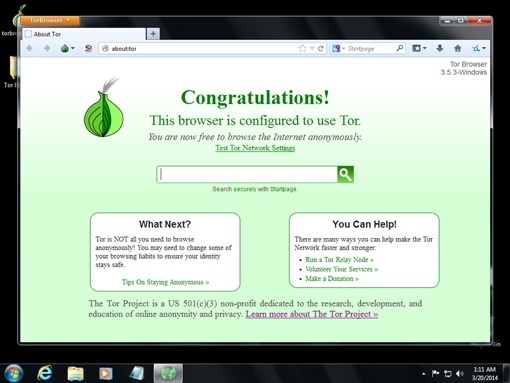 There are plenty of solid, legitimate reasons to want to surf the web anonymously. Maybe you’d like an additional level of protection against snoopy advertisers. Or, perhaps, you’d prefer to make it harder for the NSA and other government agencies to look at your private info and Internet activity out of principle. So little is private online these days that it makes sense to want to cover your tracks, simply to maintain full control over your own data.
There are plenty of solid, legitimate reasons to want to surf the web anonymously. Maybe you’d like an additional level of protection against snoopy advertisers. Or, perhaps, you’d prefer to make it harder for the NSA and other government agencies to look at your private info and Internet activity out of principle. So little is private online these days that it makes sense to want to cover your tracks, simply to maintain full control over your own data.
One of the most powerful tools for maintaining online privacy is the browser Tor. Once a more obscure option, Tor has gained a lot of popularity over the last few years thanks to its “onion routing” feature. It uses multiple layers of encryption and multiple relays when connecting to sites on the net, making it prohibitively difficult for anyone to trace the identity of the person surfing and the identity of the sites being visited. Tor is so good at what it does, in fact, that a secret, leaked NSA document called the browser “the King of high secure, low latency Internet anonymity.”
Tor’s success in protecting anonymity has drawn some criticism from certain organizations – organizations that have a vested interest in tracking your every move online. The Guardian, the same top-notch British paper responsible for publishing the Ed Snowden leaks, revealed last year that the NSA is actually targeting Tor users, assuming they must have something to hide. And earlier today, a story made the rounds about representatives from Comcast threatening to disconnect service of customers who use Tor, assuming all activity on the browser must be illegal unless proven otherwise.
Comcast has since made a public statement saying it has no such official stance against the ultra-private browser. “We have no policy against Tor, or any other browser or software,” explains Comcast VP Jason Livingood. “Our customers can use Tor at any time, as I have myself.”
 To be fair, not all traffic routed through Tor is legitimate and lawful. The browser has proven popular with those trying to hide online drug deals and child porn – really, the worst of the worst on the web. But still, this is America. Our constitution protects a right to privacy, and the “why worry if you don’t have anything to hide” line of thought is a direct attack on it. The vast, vast majority of Tor users are likely lawful, everyday people like you and me concerned about our privacy.
To be fair, not all traffic routed through Tor is legitimate and lawful. The browser has proven popular with those trying to hide online drug deals and child porn – really, the worst of the worst on the web. But still, this is America. Our constitution protects a right to privacy, and the “why worry if you don’t have anything to hide” line of thought is a direct attack on it. The vast, vast majority of Tor users are likely lawful, everyday people like you and me concerned about our privacy.
It’s understandable how a Comcast representative could have gotten things wrong, misrepresented the company’s policy or was operating under legacy rules from one of Comcast’s many acquired divisions. After all, Comcast isn’t exactly well-run. Still, if you’re forced to use the ISP out of lack of other options, it’s important to remember you do have a right to privacy online, no matter what the person on the other end of the phone says. If you want to use a private browser to shield your activity from Comcast or anyone else, you can – without need to explain yourself to someone. Privacy may be under attack, but it’s not dead.
You can try out the free Tor browser, available for Windows, Apple OS X and Linux, by downloading it direct from torproject.org. For more on protecting your personal information while online, check out these 11 simple privacy tips.
















